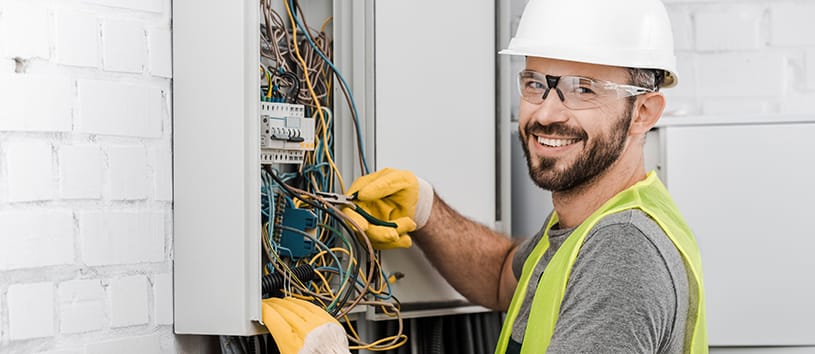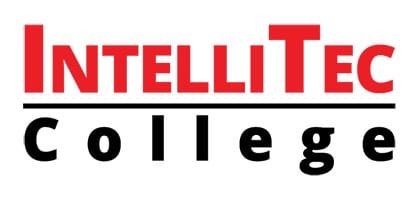Get the Skills to Be a Professional Electrical Technician

10.5 Month* Hands-On Electrical Technician Training Program in Pueblo and Colorado Springs
Every community needs electrical work, which is why becoming an Electrical Technician is a smart career choice. It’s an extremely hands-on field, and there are many private and public sector opportunities available as you go from apprentice to master.
The Electrical Technician program from IntelliTec College enables you to build the skills and confidence you need to succeed in a career in the electrical field. With practical, hands-on training, small class sizes, and job placement assistance, you will feel prepared and supported to pursue your career goals upon graduation.
What Does an Electrical Technician Do?
Electrical Technicians install, maintain, and repair electrical wiring, communications and control systems. They ensure that work is in accordance with relevant codes. They may install or service street lights, intercom systems, or electrical control systems.
Next Start Date: Nov 4thElectrical Technician IntelliTec College - Albuquerque 4575 San Mateo Blvd NE - Suite K Albuquerque NM USA 87109 Are you interested in starting a rewarding career in the Electrical industry? You can get the skills and training you need to become an Electrical Technician in as little as 10.5 months.*https://intellitec.edu/wp-content/uploads/2020/10/adobestock_225354243_wphero.jpgIntelliTec College

Electrical Technicians
$60,040 median annual salary ($28.87 per hour)***
- Number of Jobs (2020): 729,600
- Job Outlook (2020-30): 9% (As fast as average)
- Employment Change (2020-30): 66,100
*** https://www.bls.gov/ooh/construction-and-extraction/electricians.htm visited on Jun 7, 2022. Salary source from Bureau of Labor Statistics, U.S. Department of Labor, Occupational Outlook Handbook, Electricians
What Knowledge Will You Gain Through IntelliTec College?
Employers seek candidates with the following qualifications:
- Electrical Coding – Making it possible to plan and execute projects.
- Conduit Bending – One of the fundamental tasks of the electrical construction industry.
- Wiring Installation – Installation of cabling and associated devices like switches, distribution boards, socket, and light fittings.
- Motors and Transformer Systems.
- Grounding and Bonding
- Raceways and Boxes
- Services, Feeders and Branch Circuits
- Overcurrent Protection
- Conductors and Cables
Electrical Technician Job Opportunities
As a successful graduate of this program, you’ll be fully prepared to pursue a variety of interesting positions, including:
- Maintenance Technician
- Electrical Service Technician
- Electrical Repair Technician
- Maintenance/Service Technician
Upon licensure or registration, additional positions include:
- Control Technician
- Residential Wireman
- Inside Wireman
- Electrician
- Journeyman Electrician
Is a Career as an Electrical Technician Right for you? Take the IntelliTec 'Trades Career Training Readiness' Quiz
This fun, online quiz takes 3-minutes to complete and you’ll get a personalized report. Identify your strengths and social style plus the training and positions you’re best suited for. Get your Trades Career Training Readinss Score Now!
Electrical Technician Salary Potential
IntelliTec College provides career-training programs for entry-level positions. Salaries vary depending on geographic location, economic conditions, and willingness to relocate. Salaries by occupation and specific location can be found on the O*NET website. National figures for labor market activity, working conditions, and price changes in the economy are available from the Bureau of Labor Statistics. You can also visit the campus career services department to learn where IntelliTec College graduates work and the beginning salaries in their respective careers.
How Is the Job Outlook for the Next 10 Years?
According to the US Department of Labor: Alternative power generation, such as solar and wind, is an emerging field that should require more electricians for installation. Increasingly, electricians will be needed to link these alternative power sources to homes and power grids over the coming decade. Employment growth stemming from these sources, however, will largely depend on government policy.
When Do Electrical Technicians Usually Work?
The majority of Electrical Technicians are employed on a full-time basis. It is common to work on weekends and some holidays.
Get All the Important Details
Electrical Technician Certificate
The Electrical Technician program is designed for students to develop the skills and knowledge for entry-level employment as an Electrical Technician, Electrical Repair Technician or Residential Wireman in the residential, commercial and construction industry. Successful graduates will be prepared to register as an apprentice, as well as, sit for the Residential Wireman exam provided by the Division of Professions and Occupations Colorado Electrical Board upon completion of required work experience of 4,000 hours.
Locations:
Program length: 10.5 Months*
Award: Certificate
Credit hours: 54
Hands-on skills students learn in the classroom and lab settings include:
- Plan layout and installation of electrical wiring, equipment, or fixtures, based on job specifications and local codes
- Connect wires to circuit breakers, transformers, or other components
- Test electrical systems or continuity or circuits in electrical wiring, equipment, or fixtures, using testing devices, such as ohmmeters, voltmeters, or oscilloscopes, to ensure compatibility and safety of system
- Use a variety of tools or equipment, such as power construction equipment, measuring devices, power tools, and testing equipment, such as oscilloscopes, ammeters, or test lamps
- Inspect electrical systems, equipment, or components to identify hazards, defects, or the need for adjustment or repair, and to ensure compliance with codes
Here’s what will you learn in the Electrical Technician Certificate program:
Is Hands-On Training for a Career as an Electrical Technician Right for You? Get More Info…
If you’re interested in exploring whether IntelliTec College’s educational training programs for career opportunities in the Electrical industry are right for you, fill out the form on this page to receive more information.
A helpful IntelliTec College Admissions Representative will be happy to answer any questions you have and can help with everything from determining the right career path for you to discussing financial aid options.
*Program length when completed as designed.
*https://www.bls.gov/ooh/construction-and-extraction/electricians.htm Visited on 5/25/2022 at 13:15.
